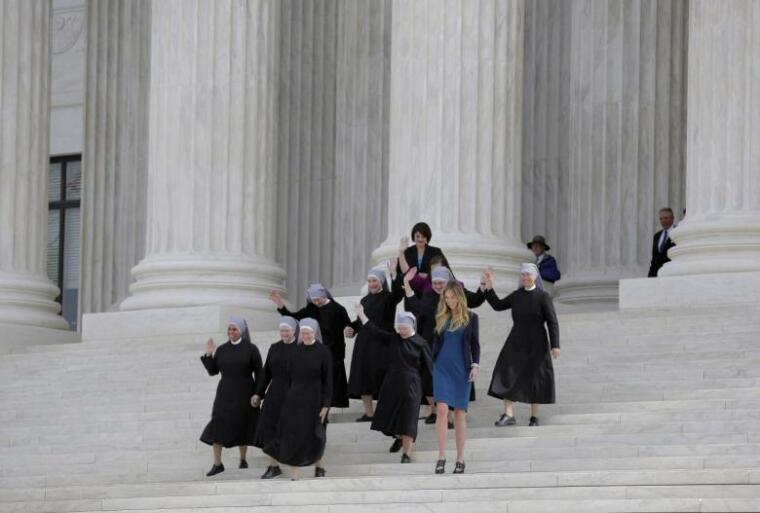Little Sisters of the Poor goes back to court to defend religious exemption from HHS contraceptive mandate

The Little Sisters of the Poor are heading back to court after several states filed a lawsuit against the religious exemption from the Department of Health and Human Services (HHS) mandate that requires employers to provide coverage for contraceptives in their healthcare plans.
Last month, President Donald Trump's administration issued an executive order providing broad religious exemptions for non-profits like the Little Sisters to protect them from having to pay for contraceptives and abortifacients.
According to Life Site News, the order states that the government will "provide regulatory relief for religious objectors to Obamacare's burdensome preventive services mandate, a position supported by the Supreme Court decision in Hobby Lobby."
Following the release of the executive order, the states of Pennsylvania and California filed a lawsuit in an attempt to take away the religious exemptions from the new HHS rule.
Xavier Becerra, the Attorney General of California, argued that the new rules allow employers to discriminate against employees and "deny them a federally entitled health benefit" by pointing to their religious beliefs.
The Little Sisters, represented by attorneys at Becket Law, are requesting the court to intervene in order to make sure they do not have to violate their faith when providing healthcare plans.
"Becket has argued all along that the government has many ways to provide services to women who want them as well as protect the Little Sisters," a case summary stated on Becket's website.
"Neither the federal government nor the state governments need nuns to help them give out contraceptives," it continued.
Mother Loraine Marie Maguire with the Little Sisters of the Poor said that members of the charitable organization only want to "continue our religious mission of caring for the elderly poor as we have over 175 years."
"We pray that these state governments will leave us alone and let us do our work in peace," she continued.
Trump's executive order had placed a limit on a rule created under the Obama administration's Affordable Care Act that required employers, including non-church religious organizations, to provide coverage for all forms of contraception, including birth control pills, abortion drugs and devices in their employees' healthcare plans.
In May 2016, the U.S. Supreme Court appeared to have ruled in favor of the Little Sisters when it unanimously ordered lower courts to review a case involving the contraception mandate.
In a separate case, the high court ruled that businesses, such as Hobby Lobby, were protected by the Religious Freedom Restoration Act of 1993, which holds that an individual's religious expression may not be "substantially burdened" by a law unless there is a "compelling government interest."
Supreme Court Justice Samuel Alito wrote in the ruling that the contraception rule would require business owners to make the difficult choice of either giving up their right to protection for their religious liberty or forgoing benefits available to their competitors.
 Christians don't have to affirm transgenderism, but they can’t express that view at work: tribunal
Christians don't have to affirm transgenderism, but they can’t express that view at work: tribunal Archaeology discovery: Medieval Christian prayer beads found on Holy Island
Archaeology discovery: Medieval Christian prayer beads found on Holy Island Presbyterian Church in America votes to leave National Association of Evangelicals
Presbyterian Church in America votes to leave National Association of Evangelicals Over 50 killed in 'vile and satanic' attack at Nigerian church on Pentecost Sunday
Over 50 killed in 'vile and satanic' attack at Nigerian church on Pentecost Sunday Ukrainian Orthodox Church severs ties with Moscow over Patriarch Kirill's support for Putin's war
Ukrainian Orthodox Church severs ties with Moscow over Patriarch Kirill's support for Putin's war Islamic State kills 20 Nigerian Christians as revenge for US airstrike
Islamic State kills 20 Nigerian Christians as revenge for US airstrike Man who served 33 years in prison for murder leads inmates to Christ
Man who served 33 years in prison for murder leads inmates to Christ


 Nigerian student beaten to death, body burned over ‘blasphemous’ WhatsApp message
Nigerian student beaten to death, body burned over ‘blasphemous’ WhatsApp message 'A new low': World reacts after Hong Kong arrests 90-year-old Cardinal Joseph Zen
'A new low': World reacts after Hong Kong arrests 90-year-old Cardinal Joseph Zen Iran sentences Christian man to 10 years in prison for hosting house church worship gathering
Iran sentences Christian man to 10 years in prison for hosting house church worship gathering French Guyana: Pastor shot dead, church set on fire after meeting delegation of Evangelicals
French Guyana: Pastor shot dead, church set on fire after meeting delegation of Evangelicals ‘Talking Jesus’ report finds only 6% of UK adults identify as practicing Christians
‘Talking Jesus’ report finds only 6% of UK adults identify as practicing Christians Mission Eurasia ministry center blown up in Ukraine, hundreds of Bibles destroyed: 'God will provide'
Mission Eurasia ministry center blown up in Ukraine, hundreds of Bibles destroyed: 'God will provide' Church holds service for first time after ISIS desecrated it 8 years ago
Church holds service for first time after ISIS desecrated it 8 years ago Burger King apologizes for 'offensive campaign' using Jesus' words at the Last Supper
Burger King apologizes for 'offensive campaign' using Jesus' words at the Last Supper Uganda: Muslims abduct teacher, burn him inside mosque for praying in Christ’s name
Uganda: Muslims abduct teacher, burn him inside mosque for praying in Christ’s name